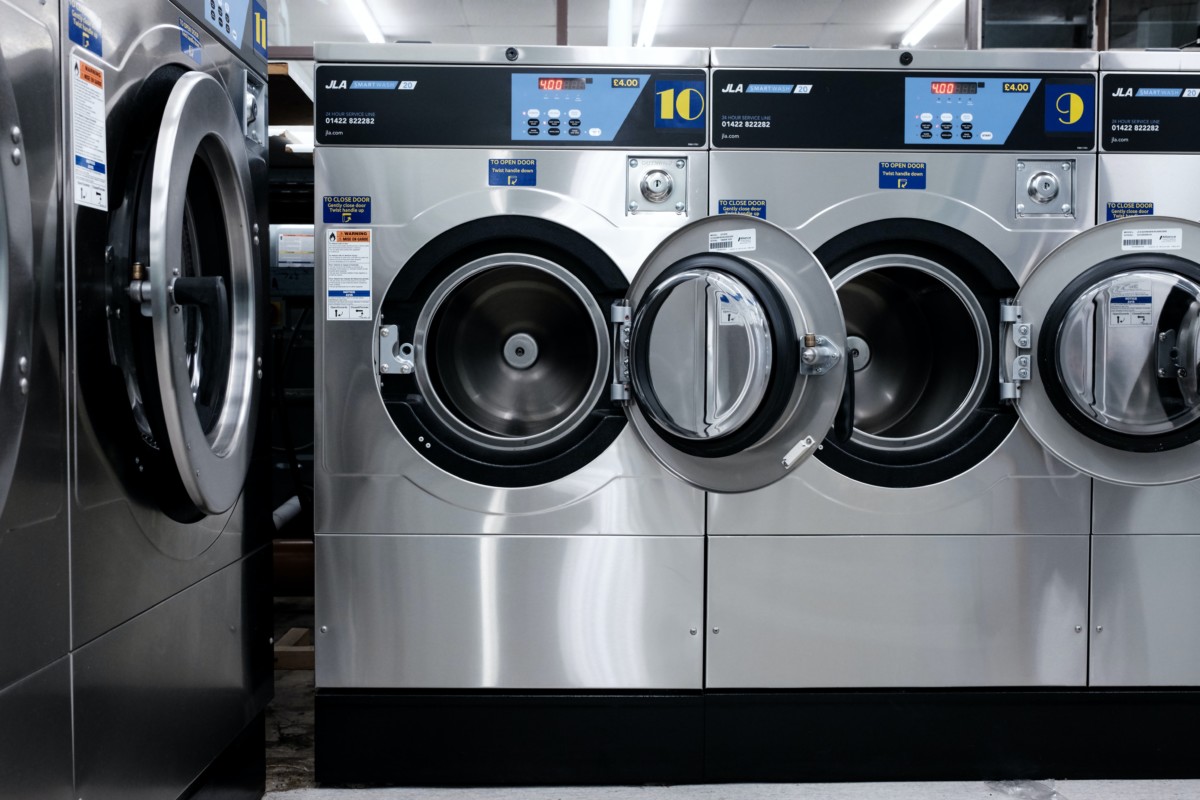There’s nothing more satisfying than a load of clean, warm laundry. However, producing clean laundry takes a lot of energy, which often leads to more carbon emissions. If you’re looking to reduce your carbon footprint at home, a more efficient dryer is a good place to start.
Dryers come in two power source options: gas and electric. They operate similarly and they look identical. So what’s the difference between these household appliances? Let’s take a look at both gas and electric dryers and compare them.
*Heat pump dryers are another electric option that are more efficient and effective than traditional electric dryers. Because this article compares standard gas and electric dryers, it will focus on heat pump dryers. To learn more, read this article.

How to figure out what dryer you currently have
Before ordering a new clothes dryer, make sure your home has the correct fuel source. A major mistake people make is buying a dryer that their home can’t accommodate. If you live in an apartment building, rental, tiny house, or older home, you most likely have an electric clothes dryer; they are the most popular choice and are easier to install. Otherwise, you may have a natural gas clothes dryer. Determining the type of dryer you have and can install is essential before deciding between gas or electric dryers.
Gas dryer
- Serial number: Find the serial number on your dryer and look it up online. If you can’t find the serial number, look on the manufacturer’s website and search for a similar-looking model. If you have doubts, call the manufacturer.
- Gas line: All gas models hook up to a gas supply line with a shut-off valve. The gas line is attached to the back or bottom of the dryer, sometimes making it difficult to find.
- Expert: Call an appliance expert if you can’t find a serial number or the gas line. They can tell you what type of dryer you have.
Electric dryer
- Serial number: Find the serial number on your dryer and look it up online. Serial numbers are usually on a reflective sticker near the door. Looking up the serial number is the most accurate way to figure out your dryer type.
- Outlet: If possible, look behind the dryer to check if it’s plugged into a three or four-prong heavy-duty electrical outlet. If it is, you have an electric dryer. If not, you likely have a gas dryer.
- Breaker box: If you can’t look behind your dryer or find a serial number, look for your dryer on your electrical panel. If the dryer breaker has a “30” or higher written on it (for the number of amps), you have an electric dryer. If it doesn’t have a number written on it, check if it has a double breaker.
- Expert: If all else fails, call an appliance expert. They can definitively tell you what type of dryer you own so you can confidently purchase a replacement.
Differences between gas and electric dryers
Gas and electric dryers operate very similarly. Both use varying amounts of electricity and have similar internal parts. However, they differ in power, heat generation, how hot they get, and safety risks.
Dryer lint is an important safety risk to consider as well. “Over time,” says Sam Elin from SG Appliance Repair, “the lint from your dryer begins to collect inside the wall of the dryer vent, restricting air flow. Your dryer won’t work properly and can catch on fire if the vent becomes restricted. Call a professional every two years to ensure your dryer vent is clean.”
Crystal Miner of Super Appliance Man also suggests taking note of lint. “A clean lint trap is important. It helps keep energy costs down, allows clothes to dry faster, and helps your dryer last longer.”
Gas dryer
- Fuel source: Gas dryers heat laundry by burning either natural gas or propane. They attach to a gas line connection in your home that comes from the area’s gas main.
- Heat generation: Gas dryers are combustion appliances. They burn gas in a burning chamber to generate heat, which is then circulated throughout the dryer by a blower wheel.
- Heating capability: Gas dryers get hotter than electric dryers in a shorter period of time. This is because burning gas is more efficient than heating an electric coil.
- Ventilation: Burning gas generates carbon monoxide, so the dryer must ventilate outside through the blower wheel. If your blower wheel is rattling or doesn’t circulate air, replace it immediately to prevent gas buildup.
- Safety: Along with the typical large appliance and lint fire hazards, gas dryers run the risk of gas leaks due to improper installation or repair.
Electric dryer
- Fuel source: Electric dryers use electricity. They plug into a large two or three-prong 240-volt outlet.
- Heat generation: These dryers use electricity to heat an electric coil inside the dryer. This heat is then circulated throughout the dryer by a blower wheel.
- Heating capability: Heating a coil requires a lot of electricity, which isn’t very efficient. Even so, electric dryers don’t get as hot as gas dryers.
- Ventilation: While electric dryers don’t need to ventilate dangerous gasses, they still blow out heavy amounts of moisture and clothing microparticles through the blower wheel. Some electric models come with a ventless option.
- Safety: Electric dryers can cause electric shocks and pose a slight fire risk. However, with proper precautions, these dangers are minimal.

Gas vs. electric dryer: energy use and sustainability
Energy sustainability depends on where the energy is generated. Electric dryers are likely the better option if solar panels, wind energy, or another renewable energy source powers your home. If not, your electricity probably comes from fossil fuels, making gas the better option.
Abigail Meier from Viridiant, a sustainability non-profit that focuses on green building certifications, green energy, and solarization, is excited about the benefits of future-proofing homes through a variety of methods. “Choosing the right dryer is a good way to start future-proofing your home. While both gas and electric options will dry your clothes, only electric dryers can use renewable energy. If reducing your carbon footprint is important to you, using an electric dryer is a good way to be eco-conscious, especially as renewable energy becomes more accessible.”
Consider ventilation as well. Most dryers vent harmful materials outside, so think about how often you use your dryer. Can you incorporate larger loads of laundry into your routine? Crystal Miner of Super Appliance Man suggests cleaning the lint trap. “A clean lint trap is important. It helps keep energy costs down, allows clothes to dry faster, and helps your dryer last longer.” If you frequently use your dryer, do your research to learn which option is best. Before purchasing a dryer, understand where your power comes from.
Gas dryer
Natural gas dryers are more energy-efficient because gas is a more efficient heat-generating source than electricity. Gas is combusted and turned into heat inside the dryer, allowing for more precise temperature control and faster drying.
Electric dryer
Drying a typical load of laundry requires a lot of electricity. Based on the average 3,000 watt (3 kWh) electric dryer, you can expect to use 3 kWh of electricity per load of laundry. This translates to twice the electricity cost and usage as a gas dryer and a larger environmental impact. An energy star electric model reduces energy consumption by about 33%.
Pro tip: vented and ventless options
Traditional vented dryers have larger capacities, dry more quickly, and cost less upfront. In comparison, ventless dryers don’t require ventilation, reduce energy costs and are a breeze to install, but are more expensive. However, vented dryers cost more to operate and install. If sustainability matters to your family, ventless dryers are greener, will continue to increase in popularity and may qualify for a rebate with your home electricity provider. – Joshua Ryan from Metropolitan Appliance
Winner: gas dryer
If your home runs on renewable energy like wind or solar, an electric dryer is the better option. However, because fossil fuels power most homes, gas dryers are typically the more sustainable option for homes that can use them.
Gas vs. electric dryer: which dryer costs more?
Most dryers come in both electric and gas versions depending on your region. Price often depends on the dryer’s features, size, manufacturer, and quality. Take long-term costs into account as well – gas dryers require significantly less energy than electric dryers, but require expensive maintenance.
Gas dryer
A gas model generally has a higher upfront cost. This is because the components for gas dryers are more expensive than their electric counterparts, and gas dryers require professional installation. Also, because qualified technicians must service gas dryers, they cost much more to maintain and repair. However, if you’re looking for luxury, both gas and electric dryers will cost about the same amount and have similar features.
Electric dryer
Electric dryers are cheaper upfront, don’t require gas lines, and can be installed by anyone, all lowering initial purchase costs. However, even energy star models use a large amount of electricity, leading to slower drying and higher costs in the long run. For example, people living in Seattle, WA, pay around 11 cents per kWh, whereas people who live in New York City, NY, pay 19 cents per kWh. This means that, on average, Seattlies pay 33 cents for a load of laundry while New Yorkers pay 57 cents.
If you live somewhere that doesn’t have ventilation, like an apartment building, you need a ventless dryer. Ventless options cost more and lead to even longer drying times.
Pro tips: take repair costs into consideration
Buying expensive appliances can be a good investment, but make sure to have them regularly serviced before problems get out of hand. It’s much cheaper to proactively repair your appliances than waiting until they break. – Marion of OnSite Appliance Service
Many homeowners are choosing expensive appliances like a smart washer and dryer. While these can be more efficient and luxurious, they have more parts that frequently break, requiring expensive repairs. – Taryn from Speedy Appliance Repairs
Winner: electric dryer
In the short term, most electric dryers are cheaper to buy and install. A new gas dryer typically costs $50 to $100 more, so expect to pay $300 on a base model electric dryer and $350 on a similar gas-powered model. Over the long run, though, gas dryers save money due to their energy efficiency.
Gas vs. electric dryer: which dryer is easier to install?
Installation usually depends on your space and the size of your dryer. However, there are some other points to keep in mind.
Gas dryer
Gas dryers require a gas hookup, which can be very expensive to install If your home doesn’t have one. To install a new gas line, your local utility company needs to come out and connect your home to the area’s gas lines.
You can also power natural gas dryers with liquid propane gas, which is stored in a tank on your property. It’s possible to convert natural gas dryers to be able to use liquid propane, but this is also expensive and requires a professional.
Electric dryer
Installing an electric dryer is easy if your home has a standard laundry room with a three or four-prong 240-volt outlet. Electric dryers usually don’t require professional installation or maintenance.
Winner: electric dryer
An average electric dryer is easier to install in most situations – you can usually install one by yourself right out of the box.

Gas vs. electric dryer: which dryer is more effective at drying?
Drying capability depends on the dryer’s model, style, brand, and cost. However, there are significant drying differences between a gas vs. electric dryer.
Gas dryer
Gas dryers are the more efficient and effective option. They can dry clothes more quickly because they get hotter, faster. This means clothes are spending less time building wear and tear tumbling around in a dryer for hours, saving you money in the long run. They also have features that make drying even more effortless, including pilotless ignition, automatic shut-off, and electronic sensor drying.
Electric dryer
Electric dryers dry more slowly because the heating element doesn’t get as hot as a gas burner. This leads to longer drying times and more damage to your clothing.
Pro tips: gas dryers can be the better option
Efficiency varies from state to state. In California, it’s more efficient to use gas dryers because gas is more affordable than electricity. However, if the consumer uses solar panels or other renewable electricity, then it’s more affordable to purchase an electric dryer. In general, gas dryers are more efficient than electric dryers; they generate more heat and dry the clothes faster. – the team at US Appliance Repair
Gas dryers are cheaper long-term than electric dryers. Depending on the area you live in, gas can be less expensive than electricity. Gas dryers are also more efficient and tend to dry clothes a bit faster than electric dryers. If you have the ability to use one, gas dryers are almost always better than electric. – the team at G and R Appliance Repair
Winner: gas dryer
Gas dryers are the all-around better option for fast, quality drying.
Experts discuss the pros and cons of gas and electric dryers
Gas dryers dry clothes more quickly and are gentler on clothes. However, they need to be placed in an area with access to outdoor ventilation to be able to operate and force heat out of the house. Electric dryers can be a great option for those who do smaller loads of laundry or have a limited laundry room space. Additionally, you can easily install an electric dryer in almost any house. – the team at 911 Seattle Appliance Repair
There’s no doubt that an electric dryer is the way to go. Electrification is the future and reducing your carbon footprint is a must. If you add solar panels after an energy efficiency upgrade or buy a house with solar, you’ll capitalize on having an electric dryer. – Mark Stout from Apollo Energies, Inc.
Gas dryers currently save you money in the long run. However, electric dryers are the future cost saver because of the falling prices of solar panels and batteries, and the need to electrify the world. – Ori Rosenkrantz from Local Energy Audits
Final thoughts: which dryer is better?
Both electric and gas dryers have their benefits and disadvantages. Gas dryers are more expensive and harder to install, while electric dryers are less efficient and effective. In order to choose the best dryer for you, take your space, budget, and laundry needs into account.
Lassad Sanane from DC Appliance Repair Service thinks both dryers have their benefits. “Gas dryers are noisier and emit carbon monoxide, but are generally more cost effective. Electric dryers tend to use more energy, but they are safer, quieter, and you can use them in areas with no available natural gas.”
If you have a gas hookup and the budget, a natural gas dryer is the better, more sustainable option. However, if you have a small home that runs on renewable energy and prefer smaller loads of laundry, an electric dryer is the smarter, more eco-friendly choice. Ideally, however, renewable energy would power the the world, making electric dryers the best option.
Addendum: heat pump dryers
Heat pump dryers are the most efficient and effective dryers on the market. They also don’t require a gas hookup or produce carbon monoxide. If you have the option, choose a heat pump dryer.
Kelly Carey, marketing specialist at Building Performance Institute, suggests heat pump dryers for any home. “The home performance specialists at BPI are enthusiastic about the opportunities for electric heat pump clothes dryers,” she says. “They are easy to install, need 40-50% less energy than a standard electric dryer, and are gentler on your clothes because they dry at lower temperatures. If you plan to add solar capacity to your home, heat pump dryers are a great way to bring down energy use before selecting an installation size.”


























 United States
United States Canada
Canada